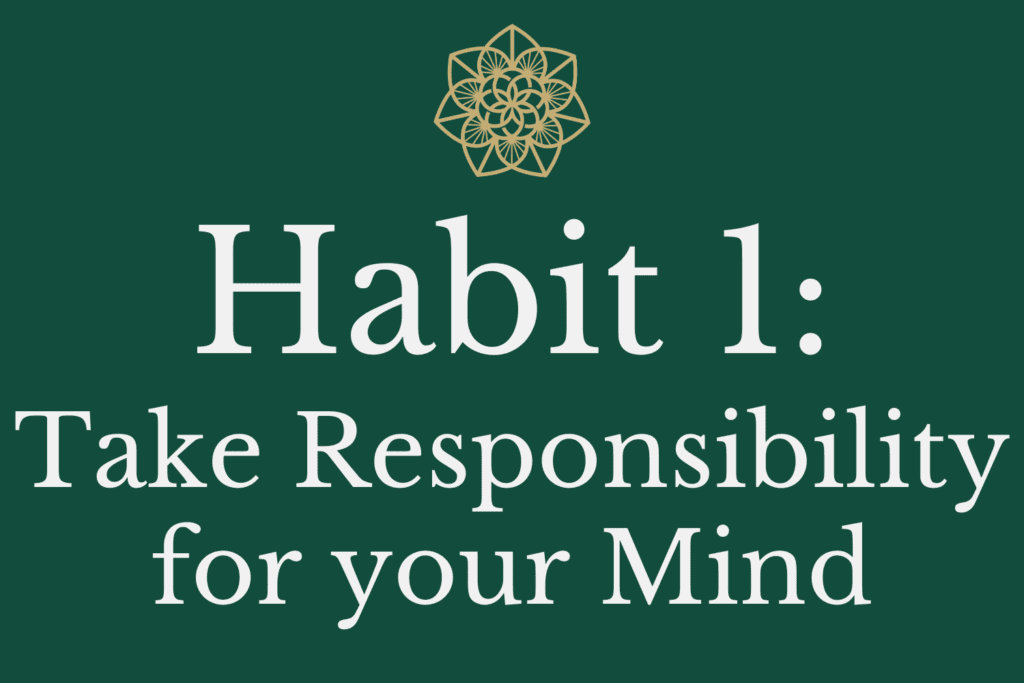The foundation of any genuine personal and spiritual growth path is the need to take responsibility for your mind.
Unless you take responsibility for your own mind, any movement in the direction of growth will be happenstance and temporary. Responsibility is how we turn our encounters and challenges in life into material that helps us to become more conscious. That is why Habit 1 of the Seven Habits of Individuation is to Take Responsibility for Your Mind.
This article serves as an introduction to Habit 1. It discusses the crucial importance of taking responsibility for your mind on the journey of individuation, how this affects our relationships and society more broadly, and offers a practical approach on how to embody this habit in daily life.
Understanding the Mind
It’s one thing to know that taking responsibility is helpful, it’s another to understand why. Habit 1 is about cultivating this understanding. It means understanding that everything we experience is our mind, and is filtered by mind. It means understanding that there is an unconscious, that it shows up for us in the external world, and that through our interactions with the world we can discover ourselves.
The concept of an unconscious mind, whilst almost entirely omitted from exoteric religious traditions and modern materialist thinking, is fundamental to addressing our spiritual challenges in the 21st century.
Habit 1 means taking an idealist, rather than a materialist view of reality, understanding that the world is led by mind, and that the only real way forward is by working on our minds. It means no longer merely wrangling with the external world in an attempt to protect ourselves. It doesn’t mean neglecting our external world, but rather working with it as a way to develop our minds.
The opposite of Habit 1 would be to assume that you are entirely separate from the world, that any suffering you experience is attributable entirely to it, that there’s no such thing as an unconscious, and that the way the ego perceives the world is, more or less, the way it is.
Practicing Habit 1
In practicing Habit 1, we understand that our impulsive cravings and aversions point to our unresolved psychological conflicts. Wherever we notice a strong pull and a craving, which leaves us sad or disappointed when not gratified, this is highlighting some deeper unconscious material to be worked through.
Someone on the way to individuation will not bypass injustice or excuse evil. On the contrary, a genuine practice of Habit 1 is contingent on seeing these facets of reality for what they are. After all, how can you know the difference between evil and what you merely dislike, unless you understand what spiritual growth means?
At the same time, and to no lesser degree, they will look to understand why each challenging encounter is showing up for them and why it impinges on their mind in the way that it does. They will reflect on questions such as:
“Why is this a problem for me?”
“What is this telling me about my own mind?”
“What am I not seeing?”
“What am I craving?”
“What am I pushing away?”
Taking responsibility for your mind instantly makes life better. As challenges are no longer seen as annoyances that have come along to upset us, but as pointing to internal conflicts to be resolved. It helps us to see people and situations as they really are, rather than merely in terms of how they impinge upon our attachments, or their ability to give us what we crave. In my opinion it is the most rewarding single decision a person can make.
Over time, with enough practice of all Seven Habits, this map eventually becomes the territory. You come to see first hand that not only are you responsible for your mind, but that what you experience is the mind.
Habit 1 and Relationships
The flourishing of any relationship or group is determined primarily by the extent to which the individuals in it are practicing Habit 1. The mutual benefit and growth experienced through relationships has far less to do with values, personality types or shared interests, and far more to do with the level of maturity of the people involved and their willingness to take responsibility for their minds.
The opposite of practicing Habit 1 in relationships would be codependency. That is to ‘lean’ on others as a way to placate one’s own unresolved conflicts, expecting the world to perpetually take the slack. This necessitates, whether consciously or not, entering into a master-slave power-dynamic.
Any two people who are practicing Habit 1 can be friends. Whilst any two who are not will have insurmountable conflict. This holds true regardless of apparent compatibility in terms of values and personality, until such a time when both individuals are practicing Habit 1.
Where one or more individuals are not practicing Habit 1, those who are will eventually distance themselves from that relationship to an extent commensurate with the lack of responsibility being taken by the other.
Those who are not practicing a genuine spiritual path will rationalise why relationships end, citing causes such as ‘incompatibility’ or ‘personality differences,’ and comforting themselves with assurances that nothing could have been done. The truth is that relationships end because one or more individuals were not practicing Habit 1.
Those craving power and control, who cling to their persona and vow never to let their guard down, remain none the wiser as to how they seal their own fate in this way. Surely no one progressed on the path to individuation is even capable of sticking around. Those who see through the facade can no more re-connect with this person than they can re-believe in Santa Claus. It is not merely a choice to move on, but the direct realisation that true connection is not nor ever was possible.
Habit 1 and Society
This truth applies at all scales, up to and including entire societies, which flourish when the individuals within them take responsibility for their minds. Arguably the one change that would most transform our society for the better would be for individuals to take responsibility and individuate, including the bringing on board of an understanding of the unconscious mind and the role it plays in forming their perceptions. This is not the prevailing stance held by much of society today, where a culture predominantly disinterested in genuine spirituality tries to wrangle with the world as a way to placate its inner uncertainty.
But unresolved conflicts cannot be avoided perpetually. The mind wants to grow and evolve into the Self. Your own mind will bring about situations that compel you to face what is hidden. Hence why nothing in this world appears permanent. To someone practicing Habit 1 this is welcomed, but to one who isn’t it’s a problem.
I’ve so far been unable to arrive at a more concise understanding of the source of societal challenges. It’s not human-induced climate change, it’s not war in Ukraine, it’s not dysfunctional economics, it’s not even greed. All of these are themselves symptoms of individuals not taking responsibility for their minds, as I describe it in the Seven Habits of Individuation.
If you believe that some kind of “global shift in consciousness” is happening or is needed, this – in a nutshell – it what it must consist of – coming to take responsibility for our minds as our default stance, to include coming to understand the unconscious, and that all of what we experience is and can only be our minds.
This view typically only comes about once a person has been strung along by their unconscious in a way so painful that any other view would be untenable – such as through exploitation by authorities who claim to be working in their interests. And a lot of people are being dangerously strung along right now.
These are the kinds of challenges a person needs in order to grow. I am optimistic. But no shift is possible without a world of growing pains.


